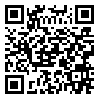Volume 6, Issue 4 (3-2019)
2019, 6(4): 57-64 |
Back to browse issues page
1- Department of Psychology, Faculty of Education and Psychology, Ferdowsi University of Mashhad, Iran
Abstract: (6128 Views)
Background & Aim: The experiences of the first years of life and the interaction style between mother with the child, specifies the foundation of child's health or illness in adulthood. Parenting styles and self-efficacy of mothers are two important factors that can affect child's anxiety. Therefore, the present study was conducted to determine the role of mother's self-efficacy and parenting style in predicting the anxiety of preschool children (5 and 6 years old) in Mashhad. Methods: Current study is a descriptive correlational study. The statistical population of this study included mothers of preschool children in kindergartens of Mashhad who were selected by random cluster sampling. The sample size in this study was 181 people. Three scales used in this study were self-efficacy of Dumka (PSAM), Baumrind Parenting styles and Spence scale of preschool children anxiety (PAS). SPSS (23) software was used for data analysis. Results: Low self-efficacy of the mother and her authoritarian parenting style can predict child's anxiety. There was a negative and significant correlation between self-efficacy of mothers and child anxiety (P≤0.006, r=-0.2); there was also a negative and significant correlation between mother's self-efficacy and authoritarian parenting style (P≤0.001, r=-0.24); the relationship between child anxiety and authoritarian parenting style was positive and significant (P≤0.001, r=0.23). Conclusion: The obtained results showed that the authoritarian parenting style and low self-efficacy have the ability to predict child's anxiety; therefore, it is suggested to consider modification of parenting style and increasing the self-efficacy of mothers in maternal empowerment programs.
Type of Study: Research |
Subject:
Special
Received: 2019/01/1 | Accepted: 2019/04/23 | Published: 2019/05/28
Received: 2019/01/1 | Accepted: 2019/04/23 | Published: 2019/05/28
| Rights and permissions | |
 | This work is licensed under a Creative Commons Attribution-NonCommercial 4.0 International License. |



